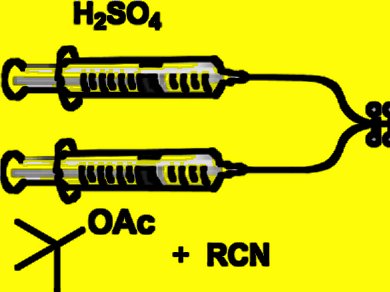Modern organic synthesis is undergoing a period of rapid change due to the many demands challenging it today. The introduction of more general platforms to perform reactions under continuous flow rather than in batch mode has led to improvements regarding safety and sustainability.
Thomas Wirth, Cardiff University, UK, and colleagues describe Ritter reactions in flow chemistry and the use of tert-butyl acetate as a convenient alternative to tert-butanol as cation source. They also employ diphenylmethanol as a versatile cation precursor to the corresponding diphenylmethyl-substituted amides. This protocol avoids the handling of large amounts of hot concentrated sulfuric acid as reaction concentrations of 2.3 m were found to be optimal to rapidly access tert-butyl- or diphenylmethyl-protected amides.
- Ritter Reactions in Flow,
Logan Audiger, Kevin Watts, Simon C. Elmore, Richard I. Robinson, Thomas Wirth,
ChemSusChem 2012.
DOI: 10.1002/cssc.201100372




